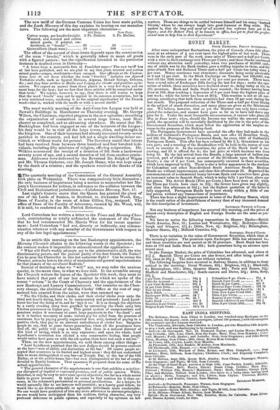- In an article this morning on the late Bankruptcy appointments,
the Morning Chronicle alludes in the following words to the Spectator; for the context makes it impossible to misunderstand the application- " What will Peel's weekly advocate say to the administrative skill, the wise discriminating powers, and the judicial purity of his dear friends, the Tories ? Can he prop the Chancellor in this last audacious flight ? Can he excuse the Premier, unless he lowers his claim of omniscience and general superintendence for that phoenix of the soi-disant Radicals." Instead of declaring what we " will " say, we may refer the anxious querist, in the mean time, to what we have said. In the scramble among the Chronicle writers for leaves of the Spectator this week, they seem to have mislaid that part of our last number in which we spoke of the recent " reform" in the Court of Chancery and the appointment of the new Bankrupt and Lunacy Commissioners. Our remarks on the Chan- cery change, the abolition of the Six Clerks' Office at the cost of aug- mented fees exacted from the suitor, were thus summed up-
" The Six Clerks, and their clerks, and their clerks' clerks even unto the third and fourth hiring, have to be compensated and pensioned : Lord Lynd- hurst has had the doing of it, and he 'lays it on.' It is as though the objectors to a costly standing army were gratified by converting the whole army into Chelsea pensioners on higher pay. This grand system of compensations and pensions makes it necessary to exact large payments to the ' fee-fund ' ; and so it is further necessary to make suitors pay for relief from the pressure of enormous fees by paying greatly augmented fees, only, instead of paying to a positive clerk, they pay to an abstract embodiment of clerks' fees. Sanguine people do say, that in some future generation, when all the pensioners have died off, the public will reap a benefit. But there is a natural distrust of this kind of saving, which is so very expensive ; and upon the whole, Lord Lyndhurst's revolution has elicited a very conservative feeling, that people would rather have gone on with the old system than have had such a reform." Then, on the new appointments, we said these among other things--
" Lord Lyndhurst promised that the new Judges should be persons eminent at the bar= men of ability and distinction at the bar.' Of course people ac- cepted that assurance in its limited and highest sense : they did not understand him to mean distinguished at any bar-at Temple Bar, at the bar of the Old Bailey, or at the public-house bar-but men distinguished at the bar of courts devoted to Equity business. That assurance ill prepared them for some of the
actual appointments. •
"The general character of the appointments is one that exhibits a mischiev- ous disregard of implied or express.d promises, and of public opinion. While, therefore, it may be easy to meet some special objections, the list as a whole seems liable to grave censure. It might be easier to find motives for it than ex- cuses, in the reformer's professional or personal predilections. As a lawyer, he -would naturally like to see lawyers well provided; as a hearty good fellow, he would like to see divers estimable or agreeable individuala made comfortable. No one would have predicted of him any stern adherence to abstract principles; no one would have anticipated from his reckless, daring character, any very profound deference to public opinion, and especially to lay opinions on law matters. Those are things to be settled between himself and his many .leeene-d friends,' whom he can always laugh into good-humour or fling aside. The upshot is, that the long and most-of all wanted law reforms have yet to be begun ; and Sir Robert Peel, if he remain in qifice, has yet to find the proles.. sional man to help him in that department."


























 Previous page
Previous page